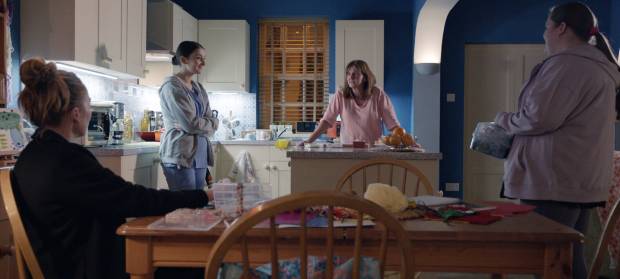Dan Scorer, Head of Policy and Public Affairs at Mencap
Tonight’s Holby City storyline highlights the huge pressure the
social care
 Social care means the services that give care and support to people who need it.
system is under, and what can happen when people with a
learning disability
Social care means the services that give care and support to people who need it.
system is under, and what can happen when people with a
learning disability
 A learning disability is to do with the way someone's brain works. It makes it harder for someone to learn, understand or do things.
can't access the help they have a right to, with families ending up in crisis situations.
A learning disability is to do with the way someone's brain works. It makes it harder for someone to learn, understand or do things.
can't access the help they have a right to, with families ending up in crisis situations.
The storyline features a nurse, Madge (played by Clare Burt), and her daughter, 19-year-old Lizzie, who is autistic and has a learning disability. Recent episodes showed Madge’s colleagues growing worried that she is being abused by her husband after she collapses due to injuries and needs surgery, but Madge discloses that the injuries are from Lizzie. In tonight’s episode (15 March 2022), it’s revealed that the family has not been able to access the right social care support for Lizzie because of funding issues. Without the right support to meet her needs, Lizzie’s behaviour has escalated and become more challenging.
At Mencap, we worked with producers to advise on aspects of the storyline alongside a family of someone with a learning disability who experienced similar issues. We hope it will raise awareness of the desperate need for more social care funding so people with a learning disability and their families can get the support they need in the
community
 A community is the people and places in an area.
and not reach a crisis situation.
A community is the people and places in an area.
and not reach a crisis situation.
The scandal of people with a learning disability trapped in inpatient units
Sometimes when people with a learning disability do not have their care needs met - for example if they don’t get the right support, live in unsuitable environments, face abuse or experience unaddressed physical health issues - they may display what is known as ‘challenging behaviour’. As is shown with Lizzie, they are episodes triggered by frustration, anxiety and pain rather than intent to harm another person.
In some cases when someone’s behaviour escalates, people with a learning disability can be sectioned under the Mental Health Act and admitted to inpatient units. Currently there over 2,000 people with a learning disability and / or
autism
 Autism is a disability. Autistic people find it difficult to understand what other people think and feel. They also find it difficult to tell people what they think and feel. Everyone with autism is different.
who continue to be trapped in units where they are at increased risk of abuse, and are also in danger of being subjected to restrictive practices - like physical restraint, chemical cosh and solitary confinement. People are also often held long distances from home with limited interaction with their families.
Autism is a disability. Autistic people find it difficult to understand what other people think and feel. They also find it difficult to tell people what they think and feel. Everyone with autism is different.
who continue to be trapped in units where they are at increased risk of abuse, and are also in danger of being subjected to restrictive practices - like physical restraint, chemical cosh and solitary confinement. People are also often held long distances from home with limited interaction with their families.
Most people with a learning disability and / or autism who end up in units could be supported in the community if the right services were in place. Once detained in units, people deteriorate because the environment is not right for them. This in turn can make their behaviour more challenging, ultimately making it harder to get them discharged. Despite often fighting for years to get loved ones out, families can be powerless against the system.
Broken Government promises
The Government
 The Government are the people who run the country. The Government decide how much tax people should pay and how things like the National Health Service (NHS) should work.
promised change following BBC Panorama’s exposure of an abuse scandal at a unit called Winterbourne View in 2011. Viewers were shocked to see footage of disabled people repeatedly being pinned down, slapped, dragged into showers while fully clothed, taunted and teased.
The Government are the people who run the country. The Government decide how much tax people should pay and how things like the National Health Service (NHS) should work.
promised change following BBC Panorama’s exposure of an abuse scandal at a unit called Winterbourne View in 2011. Viewers were shocked to see footage of disabled people repeatedly being pinned down, slapped, dragged into showers while fully clothed, taunted and teased.
The Transforming Care programme was the government’s response to the public outcry about the shocking abuse, and they promised that people in inpatient units would be supported to move back to their local communities by June 2014. A decade on, over two thousand people with a learning disability are still trapped and deadline after deadline has been missed to close beds. The government has failed to deliver on its promise to 'Transform Care’ and we are waiting for a new
strategy
 A strategy is a plan to show what an
organisation
A strategy is a plan to show what an
organisation
 An organisation are a group of people who work together.
, or a person, wants to do and how they are going to do it.
to be published setting out what the government will do.
An organisation are a group of people who work together.
, or a person, wants to do and how they are going to do it.
to be published setting out what the government will do.
For many years Mencap’s ‘Homes Not Hospitals’
campaign
 A campaign is when people work together to try to change something.
has called for urgent, national, system change to stop people being admitted to these settings. We want to see people with a learning disability back home in their communities, living fulfilling lives close to their families and friends, with proper support in place for them in their local area. This will require the government to properly fund social care, and for the government, NHS and local authorities to work together to provide the right support and housing people need.
A campaign is when people work together to try to change something.
has called for urgent, national, system change to stop people being admitted to these settings. We want to see people with a learning disability back home in their communities, living fulfilling lives close to their families and friends, with proper support in place for them in their local area. This will require the government to properly fund social care, and for the government, NHS and local authorities to work together to provide the right support and housing people need.
The Holby City storyline highlights the struggles some people with a learning disability and their families are facing, and raises the issues of what can happen in the most serious cases. People deserve the right support – and families shouldn’t have to live in fear that, without it, their loved ones could end up trapped in what are essentially modern-day asylums.
To find out more information about the Government’s Transforming Care programme and Mencap’s campaigning, visit Mencap’s
website
 A website is a page you can go to on the internet like Google or YouTube.
: https://www.mencap.org.uk/get-involved/campaign-mencap/governments-broken-promise-transform-care
A website is a page you can go to on the internet like Google or YouTube.
: https://www.mencap.org.uk/get-involved/campaign-mencap/governments-broken-promise-transform-care
Mencap is also encouraging people to add their voice to fight for change here: https://secure.mencap.org.uk/en-gb/transforming-care
If you are worried that someone you know with a learning disability and/or autism is at risk, you can contact Mencap’s Freephone Learning Disability Helpline: 0808 8081111 or email helpline@mencap.org.uk.

 Dan Scorer
Dan Scorer